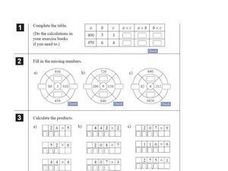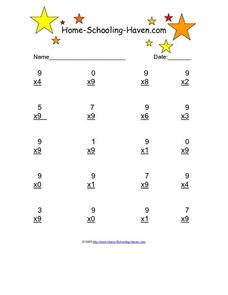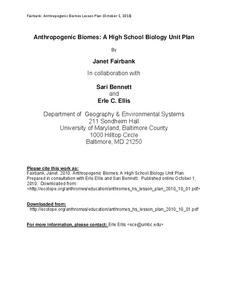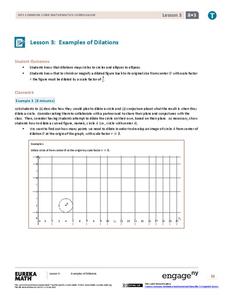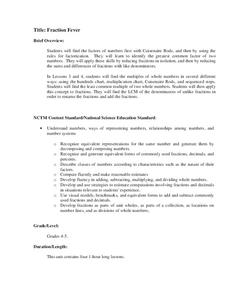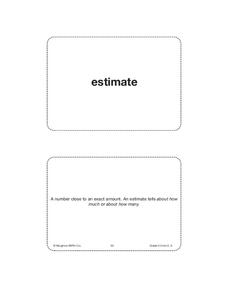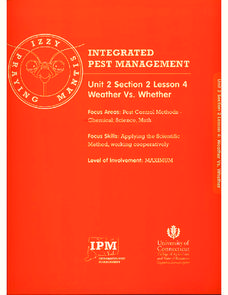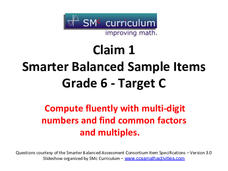Columbus City Schools
Biome Basics with a Disastrous Twist
Bored with your current biome bag of tricks? This bundle is a bountiful bag of biome fun! Travel the globe with seventh graders and explore the biotic and abiotic factors that define our world's biomes. Then, introduce a little chaos to...
Curated OER
Dilations and Similarity
In this dilations and similarity worksheet, pupils solve 10 different problems that include various dilations. First, they determine the scale factor of dilations found in the illustrated graphs. Then, everyone determines the coordinates...
EngageNY
Dilations from Different Centers
Can you follow a composition of transformations, or better yet construct them? Young mathematicians analyze the composition of dilations, examining both the scale factor and centers of dilations. They discover relationships for both and...
Curated OER
Fill in the Missing Factors Worksheet
In this missing factors worksheet, students replace letters with numbers in a multiplication table that contains 6 problems. They fill in the missing numbers in 3 number circles, and find the missing factors in 12 vertical multiplication...
EngageNY
The Euclidean Algorithm as an Application of the Long Division Algorithm
Individuals learn to apply the Euclidean algorithm to find the greatest common factor of two numbers. Additionally, the lesson connects greatest common factor to the largest square that can be drawn in a rectangle.
Science 4 Inquiry
The Ups and Downs of Populations
As the reality of population decline across many species becomes real, pupils learn about the variables related to changes in populations. They complete a simulation of population changes and graph the results, then discuss limiting...
Curated OER
Multiplication Fact Practice- 2, 3, 4, 5 as Factors
In this multiplication fact practice worksheet, 3rd graders complete 16 single row grids using 2, 3, 4, and 5 as factors.. They use the number in the upper left hand corner to multiply the numbers across the row.
Curated OER
One Digit Multiplication - 3 as a Factor
In this multiplication worksheet set, learners find the products to 80 single digit multiplication problems. They work with the number 3 as a factor in each problem.
Curated OER
Single Digit Multiplication - 6 As A Factor
In this multiplication activity set, student find the products in 80 single digit multiplication problems. They work with 6 as a factor in each problem.
Curated OER
Single Digit Multiplication - 9 As a Factor
In this multiplication worksheet set, students find the products in 80 single digit multiplication problems. They work with 9 as a factor in each problem.
Curated OER
Single Digit Vertical Multiplication - 8 As a Factor
In this multiplication worksheet set, learners find the products in 80 single digit, vertical multiplication problems. They work with 8 as a factor in each problem.
Curated OER
Anthropogenic Biomes
If you teach a man to fish, he will never go hungry—or he will overfish and permanently damage the ecosystem? Address the traditional biomes as well as the human-included ecosystems and contrasts the biotic and abiotic factors in each....
EngageNY
Examples of Dilations
Does it matter how many points to dilate? The resource presents problems of dilating curved figures. Class members find out that not only do they need to dilate several points but the points need to be distributed about the entire curve...
EngageNY
Dilations on the Coordinate Plane
Dilations from the origin have a multiplicative effect on the coordinates of a point. Pupils use the method of finding the image of a point on a ray after a dilation to find a short cut. Classmates determine the short cut of being able...
National Security Agency
Fraction Fever
This unit on fractions allows for upper-aged elementary learners to explore ways to find the greatest common factor and least common multiple of two numbers. Ultimately, young mathematicians will be able to identify equivalent fractions,...
Teach Engineering
Biomes and Population Dynamics - Balance Within Natural Systems
How large can a population become? The fifth installment of a nine-part unit teaches young ecologists about limiting factors that determine the carrying capacity of species in the Sonoran Desert. Here is a PowerPoint to help present this...
Curriculum Corner
Lucky Math
No luck required here! A St. Patrick's Day-themed missing-factor presentation prompts young mathematicians to read a multiplication problem and select the answer to complete the equation. Clicking on the correct answer allows players to...
Alliance Theater
The Jungle Book Post-Show STEAM Lesson
An ecosystem is really just the flow of energy through many different living organisms. A study of Rudyard Kipling's The Jungle Book leads to an environmental science activity in which learners study how various factors can affect...
Houghton Mifflin Harcourt
Unit 5 Math Vocabulary Cards (Grade 5)
Reinforce math vocabulary with a set of flashcards. Twenty-two cards offer either a bold-faced word card or a corresponding definition card equipped with an example and labels. Terms include factor, repeating decimal, unit fraction, and...
University of Connecticut
Weather Vs. Whether
Monarch butterfly populations have decreased by 90 percent over the past 20 years due to misuse and ineffectiveness of some pesticides. Given the challenge to increase pesticide safety and effectiveness, the class, through discussion,...
CCSS Math Activities
Smarter Balanced Sample Items: 6th Grade Math – Target C
Are you looking for review questions before standardized testing? Grade 6 Claim 1 Item Slide Show offers nine questions covering a variety of topics using decimals, factors, and multiples. With separate slides for answers, using the...
Curated OER
Missing Numbers in Equations (A)
Learners observe one factor and the sum and fill in the blank for the other missing factor. They solve 32 problems.
Illustrative Mathematics
How Many Leaves on a Tree?
This is great go-to activity for those spring or fall days when the weather beckons your geometry class outside. Learners start with a small tree, devising strategies to accurately estimate the leaf count. They must then tackle the...
EngageNY
Fundamental Theorem of Similarity (FTS)
How do dilated line segments relate? Lead the class in an activity to determine the relationship between line segments and their dilated images. In the fourth section in a unit of 16, pupils discover the dilated line segments are...
Other popular searches
- Common Factors
- Factors of Production
- Biotic
- Factors and Multiples
- Abiotic and Biotic Factors
- Abiotic
- Factors That Affect Climate
- Abiotic Factors
- Limiting Factors
- Biotic Factors
- Greatest Common Factors
- Conversion Factors





